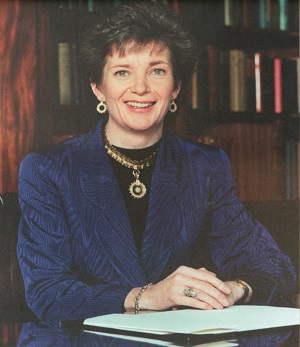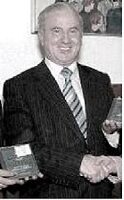
The film Mrs Robinson, directed by Aoife Kelleher and produced by Cormac Hargaden and Trisha Canning for Loosehorse went on general release at the end of August 2024. The film tells the life story of Ireland’s first female Head of State, and of her battles over fifty years for gender equality, human rights, and social justice for all humankind, and in later years for climate justice.
On December 3, 1990, Mary Robinson, a constitutional lawyer, caused a national and international sensation with her election as the seventh President of Ireland. Born Mary Bourke in Ballina, County Mayo, on May 21, 1944, she was the only daughter in a family of five born to Aubrey Bourke and his wife Tessa, née O’Donnell from Carndonagh, County Donegal, both medical doctors. Mary was educated at Ms Ruddy’s private school in Ballina before going to Mount Anville Secondary School in Dublin, then to a ‘finishing school’ for a year in Paris, before going on to become a distinguished law student at Trinity College, Dublin, the King’s Inns, and Harvard Law School. After qualifying as a barrister, she was appointed Reid professor of constitutional and criminal law in Trinity College, Dublin, at the age of twenty-five. Later, she took a number of high-profile constitutional cases in Ireland as well as to the European Court of Human Rights and the European Court of Justice on issues like women’s right to sit on juries, access to legal aid, the concept of ‘illegitimacy’, decriminalisation of homosexual acts, and discrimination against married women under the social welfare acts, which led to many changes in the law. After her election to Seanad Éireann as a representative of the University of Dublin in November 1969 (a seat she held until July 5, 1989), she promoted the liberalisation of Irish law, and used the chamber to support reform in women’s rights, gender equality, human rights, and social issues in general.
Following her election as President of Ireland, she paid a special tribute to the women of Ireland, mná na hÉireann. In her inaugural address, she spoke about her ambition to represent ‘a new Ireland: open, tolerant, inclusive’. A very successful and popular president, she completely transformed the conservative nature of the office, using her position to promote inclusiveness and empowerment, especially with voluntary community organisations and minority groups. She reached out to the Irish diaspora, placing a light in the window of the family kitchen in Áras an Uachtaráin as a symbol of her concern for those who had left Ireland, and she made numerous visits to Irish communities around the world. One of her major achievements was to bring the suffering of the people of Rwanda to world attention in October 1995 after a terrible civil war in that part of central Africa. In May 1993, Mary Robinson visited Queen Elizabeth in Buckingham Palace, the first official meeting between the Irish and British Heads of State since Irish independence in 1922. She insisted on being addressed by her correct constitutional title, President of Ireland. Her single presidential term ended on September 12, 1997, when she resigned to become United Nations High Commissioner for Human Rights, a position she held until September 12, 2002. In her United Nations’ role, she visited numerous countries promoting human rights, including China, and was courageous in ‘speaking truth to power’, wherever she saw abuse.
For eight years after leaving the United Nations post, Mary Robinson led ‘Realizing’, an organisation pioneering the implementation of economic and social rights, especially in African countries. She established the Mary Robinson Foundation — Climate Justice in 2010, addressing how people are affected by climate change, and became a world champion for climate justice. In 2014, she was appointed as the United Nations special envoy on climate change and later to a number of other posts. Mary Robinson has served as Chancellor of the University of Dublin and as honorary President of Oxfam. She received numerous honorary degrees, awards and honours, including, in July 2009, the Presidential Medal of Freedom from President Obama, the highest civilian honour awarded by the USA. In 2007, she was invited to join a group to be known as The Elders, a small number of independent world leaders brought together by Nelson Mandela to foster reconciliation, respect for human rights, and hope wherever there is conflict in the world, and she is now its influential moral leader. In the film, she recalls these battles over her lifetime in her own words. Bono and Irish songwriters Gemma Doherty and Morgan Mac Intyre contributed a special song for the film’s soundtrack ‘Women of the World’.
